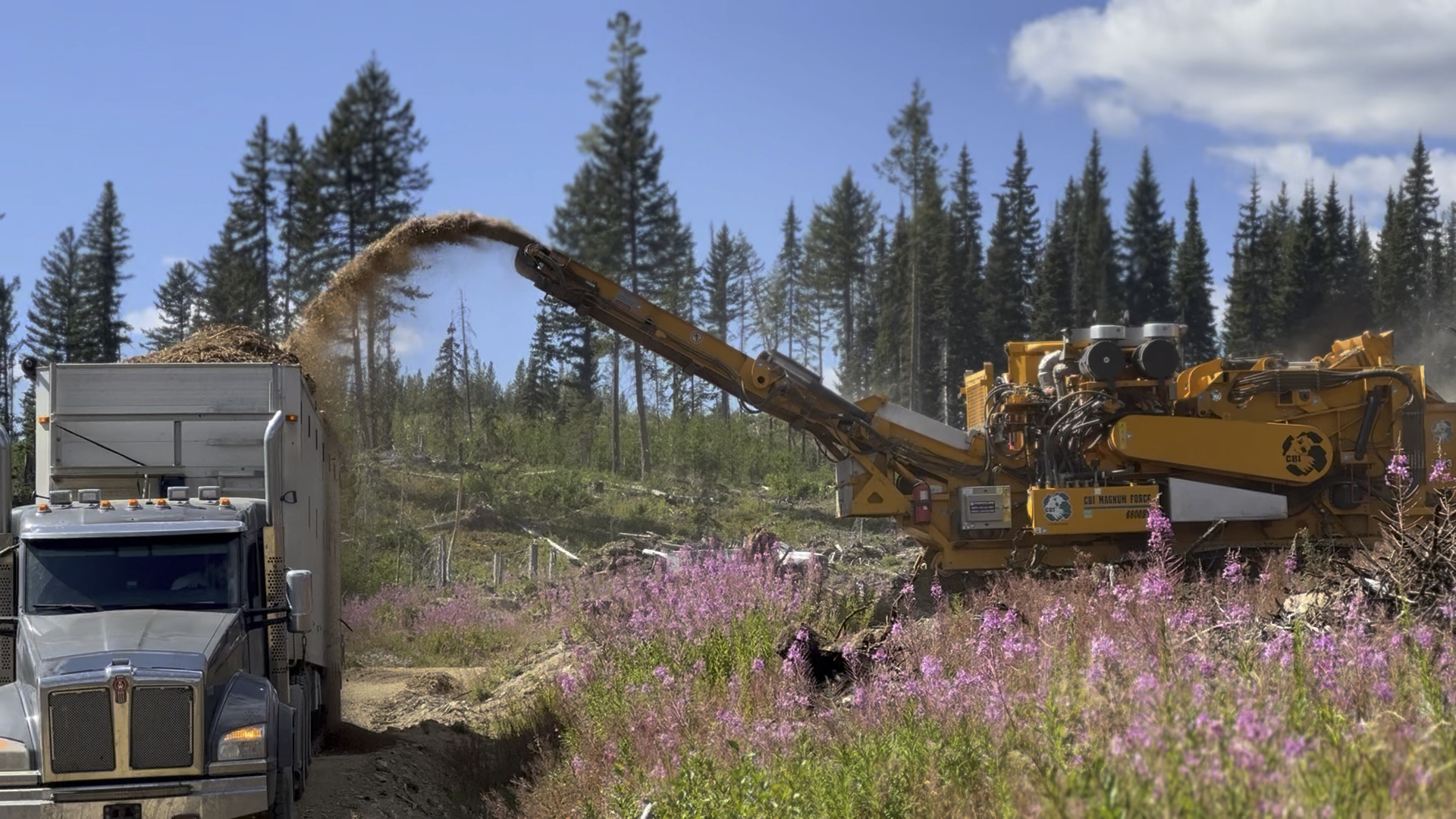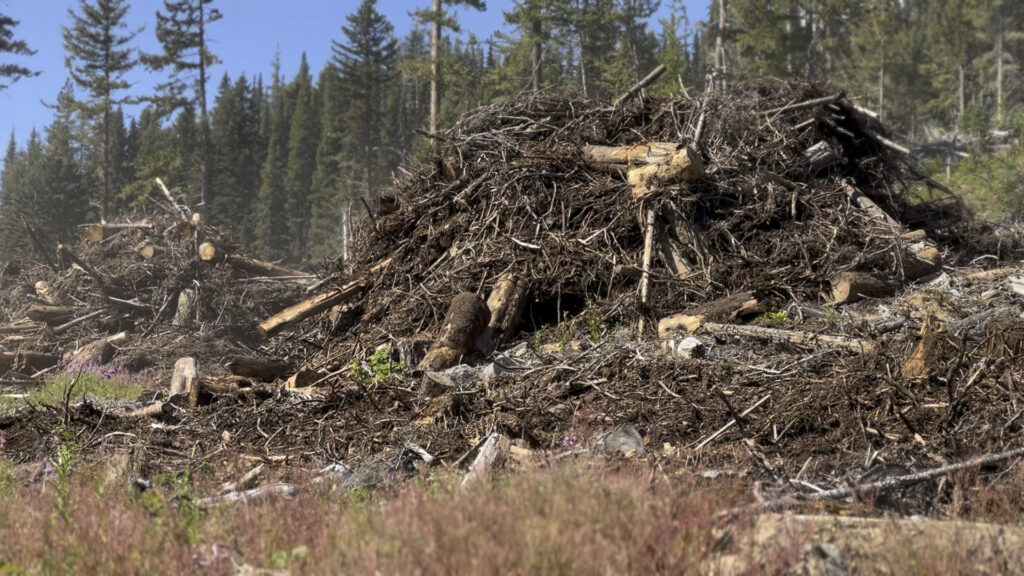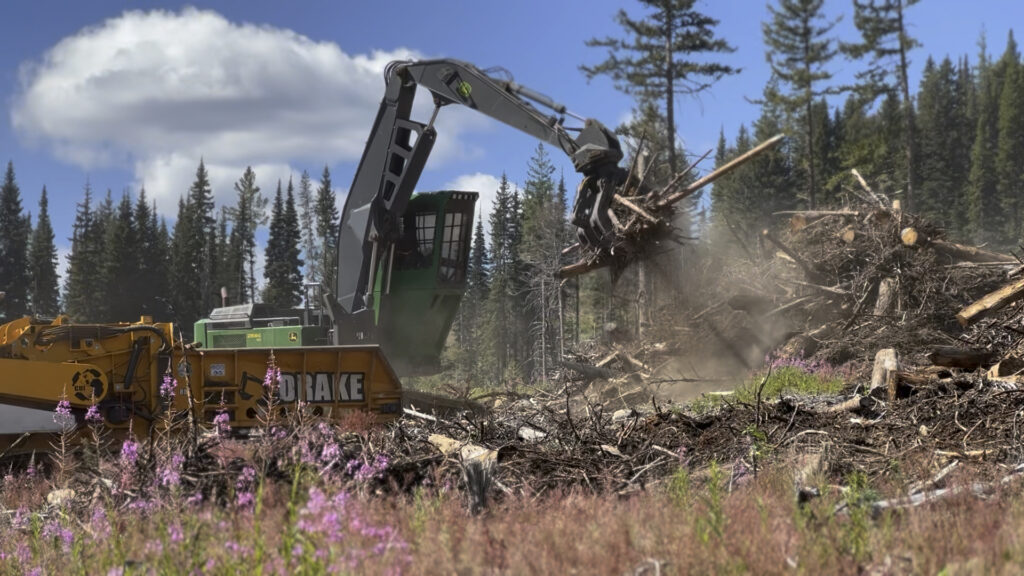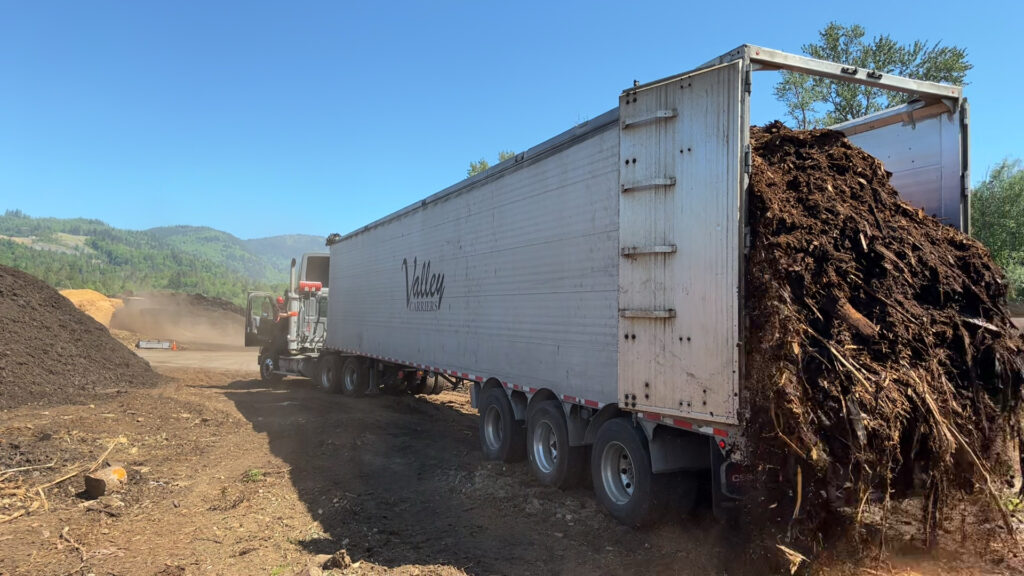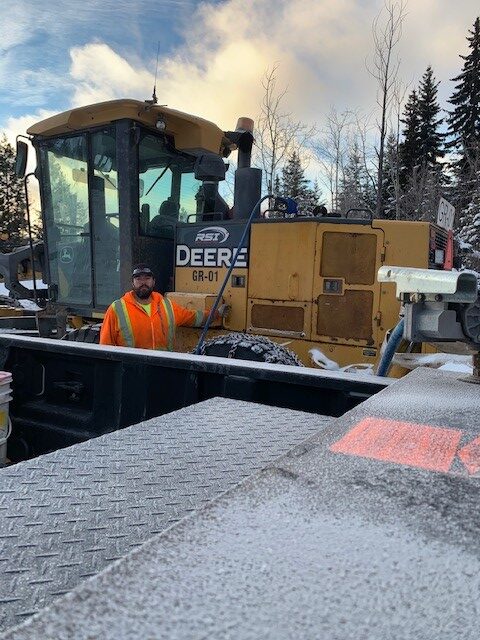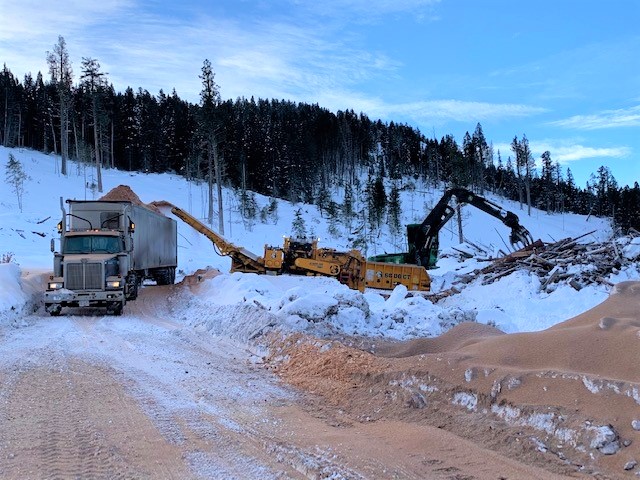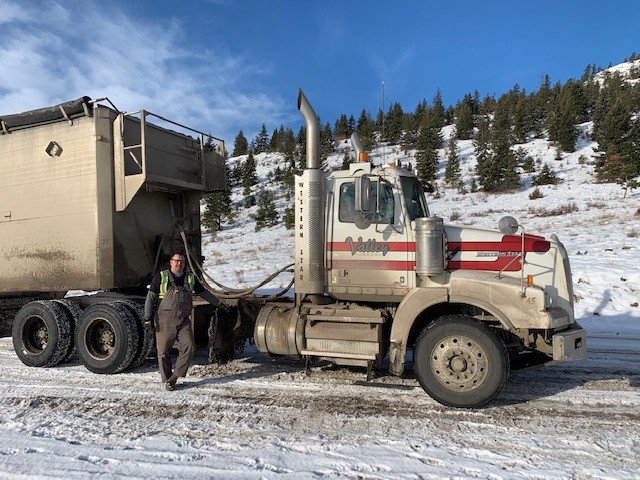-How two Merritt-based companies are revolutionizing sustainable forest management-
Merritt, B.C. – In a long-standing alliance, a First Nations-owned and operated fibre management company, Stuwix Resources Joint Venture (SRJV) and Valley Carriers, a visionary multi-generational trucking and specialty transportation company, are working together to make better use of leftover forest materials, i.e., forest residuals. With support from the Forest Enhancement Society of BC (FESBC) funding for a Bush Grind Project, the partners aim to turn these residual materials into valuable biomass products, and they’re pushing the boundaries even further with a significant leap forward in a BioHub Pilot Project, dedicated to managing forest resources sustainably.
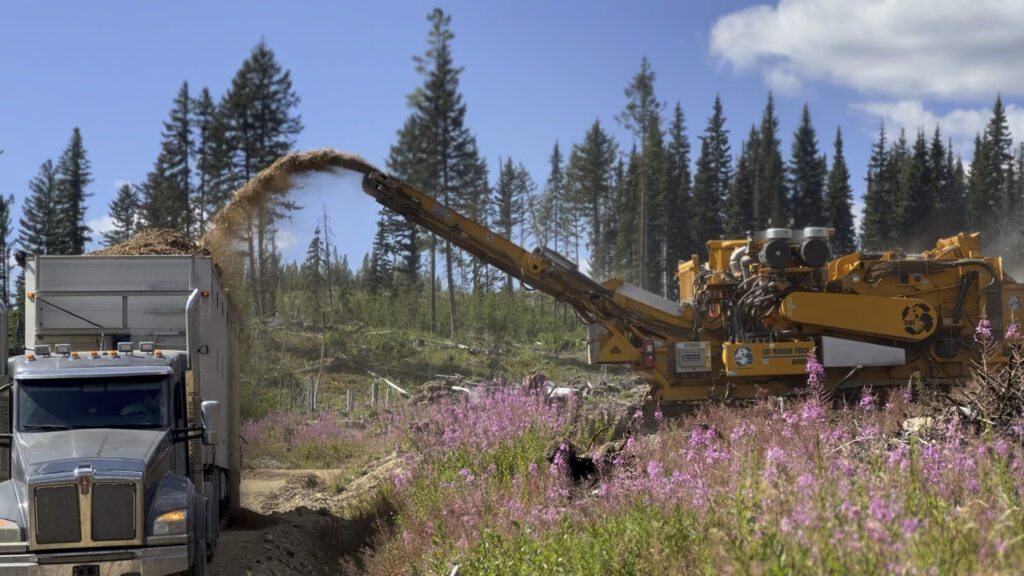
Photos credit: Stuwix Resources Joint Venture.
The BioHub Pilot Project is centred around the transition that the SRJV is now pursuing, changing from the traditional cut-to-length forestry practice to now full-length tree harvesting, moving toward a full tree utilization and zero-waste approach. This is an enormous step in sustainable forestry practices with significant impacts on forestry residue management. A part of this project is bush grinding of the residuals, for which FESBC has provided funding. Through the Bush Grinding project, forest residuals will be ground instead of being left behind and burned in slash piles, helping to reduce waste and avoid greenhouse gas emissions. This ground fibre will be transported to a green energy facility in Merritt. By extending the use of forest residuals, the two companies look to improve the sustainability of forestry practices by being better stewards of the land.
“Projects like this are a significant step towards a stronger and more sustainable B.C. forestry sector, transforming harvest residue that was once considered waste into value,” said Bruce Ralston, Minister of Forests. “This collaboration between Stuwix Resources Joint Venture and Valley Carriers, with support from FESBC, will also help protect communities from wildfire risks by removing residue from the forest floor, thereby removing wildfire fuel.”
SRJV currently manages the Forest Tenure Opportunity Agreement and the non-replaceable forest licenses on behalf of eight First Nations communities in the Nicola Valley. SRJV’s approach to forest management reflects the cultural, environmental, and social values of these First Nations with a vision to promote healthy ecosystems and communities while integrating traditional uses and practices.
Valley Carriers is part of the family-owned and operated Klassen Business Group, which was founded in 1963. They’ve been working with forest residuals for 60 years, and the family of companies produces and distributes both wholesale and retail wood residual-derived products such as mulch and wood shavings.
Together, the organizations exemplify positive collaboration to pursue the common goal of reducing waste and enhancing the utilization of fibre. However, the project was not envisioned in silos, but came about as a result of the community’s desire to see better-managed forests, according to Lindsay Tighe, General Manager of SRJV.
“It’s all community-driven. Our community strongly believes we need to better utilize the resources that the forest provides. Without the partnership with FESBC, we wouldn’t be able to pursue the transition to full fibre utilization. Their support is critical to enable our operations to adapt to this more sustainable approach,” said Tighe.
The Bush Grind Project is part of a Biohub Pilot Project, with an overarching vision to eradicate the age-old practice of underutilizing, piling, and burning forestry residuals but instead offer a sustainable alternative, converting these residuals into valuable resources, such as clean energy sources, including biogases, advanced biofuels, and various end-use products. By utilizing the entire resource, the two partners are not only respecting the resource itself and the land it is from, but they hope to increase the wood fibre supply for the agriculture, bioproduct, and bioenergy sectors that depend on the biomass generated by the forestry sector.
Ben Klassen, CEO of Valley Carriers, said, “The funding from FESBC is integral for the pilot project, as it helps minimize the risks to private businesses and enables creativity in creating a more sustainable industry.”
The BioHub Pilot Project is a partnership between SRJV, Valley Carriers, FP Innovations, and with support from FESBC funding, it serves as a symbol of improved forestry management practices, emphasizing complete stem utilization.
FESBC Senior Manager, Gord Pratt, said, “FESBC is proud to support the initiatives led by Stuwix and Valley Carriers in finding ways to increase the use of forest fibre that has traditionally not been utilized. Exploring new ways to optimize the delivery and use of forest fibre is long overdue and will only help the economy of the Merritt area. Lessons learned here will help other regions of the province and assist in building a more stable and diverse forest industry which is critical for the future of rural B.C.”
A centralized, sustainable BioHub, capable of handling a broader spectrum of forestry residuals, will help meet the surging demand for wood residuals and biomass. The goal is to create a variety of value-added products for diverse sectors from what was traditionally thought of as wood waste.
“Our BioHub will increase the stream of residuals and help stabilize the supply of wood fibre to support the needs of the agricultural and clean energy sectors. This project is about using every metre of the forest in the most sustainable way,” said Klassen.
The benefits of the work are far-reaching and move beyond the environmental benefits. By transitioning to full-stem utilization and establishing the BioHub, SRJV will create eight jobs, and Valley Carriers will create an additional eight positions in Merritt, B.C. during the various phases of the project. Considering the level of unemployment in the area and the need to diversify, Klassen and Tighe agree that these jobs mean a lot to people in the region.
“This funding allows us to grow our operations and create more employment. The business of recovering under-utilized residuals has allowed our company to maintain steady employment for 25-30 people in Merritt for the last six years, and we are looking to grow with further resource utilization,” said Klassen.
For companies and communities wanting to move toward full fibre utilization, Klassen recommends maintaining their focus. “Even after many years doing this work, we are still trying to find a long-term solution that isn’t just made up of stop-gap funding. We’ve been able to do this for the last half-decade by not relenting on the conversation,” he said.
From the creation of new jobs to local access to renewable energy, decreasing the waste of natural resources and increasing the supply of wood fibre to combat the shortage in the agricultural sector, the project has a vision to move beyond traditional forestry. In addition to these benefits, fully recovering the forest residuals will remove excess materials that can fuel wildfires while also reducing greenhouse gas emissions associated with burning these materials in the forest.
“We know we have less wood available; now we need to focus on how to use it properly. It’s like water restrictions; when they are in place, sustainable practices and real change starts to happen. We need to be the ‘Arizona’ of forestry; the forestry industry is not going away, but it is our time to pivot, focus on efficiencies and fully utilize the resources. Everyone can make a difference in forestry residual management, whether it’s a big or small licensee,” said Klassen, adding, “We don’t see this as the end but the start of something that will transform the industry.”
FESBC would like to gratefully acknowledge the financial support of the
Province of British Columbia through the Ministry of Forests.

